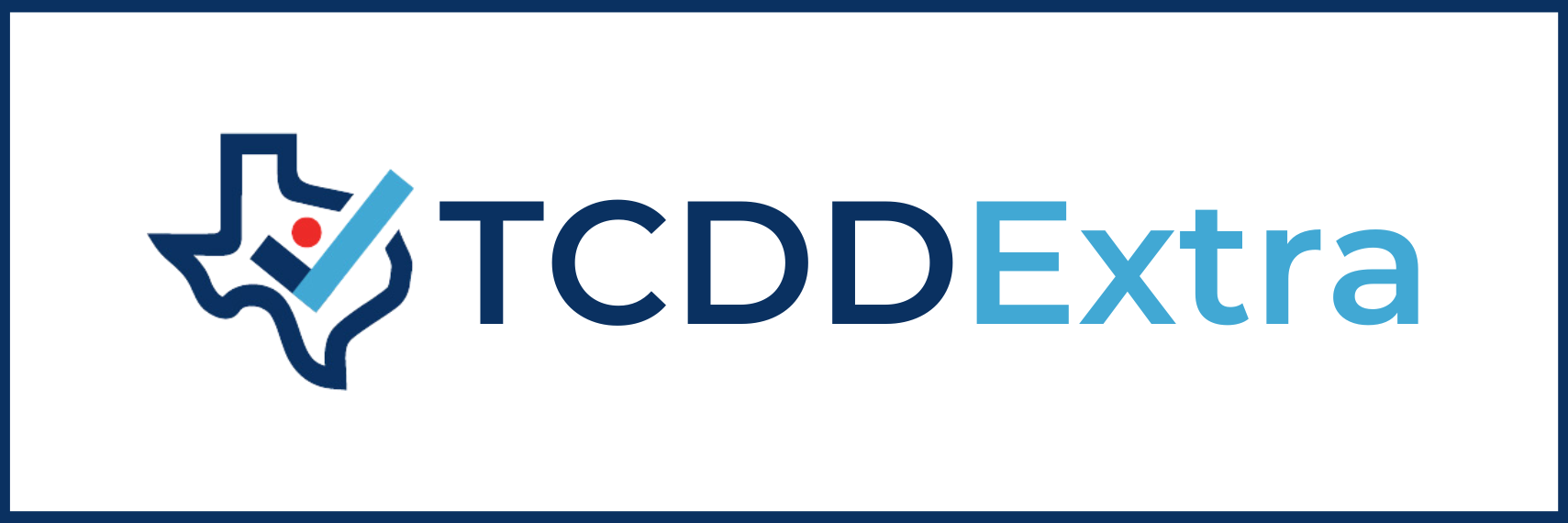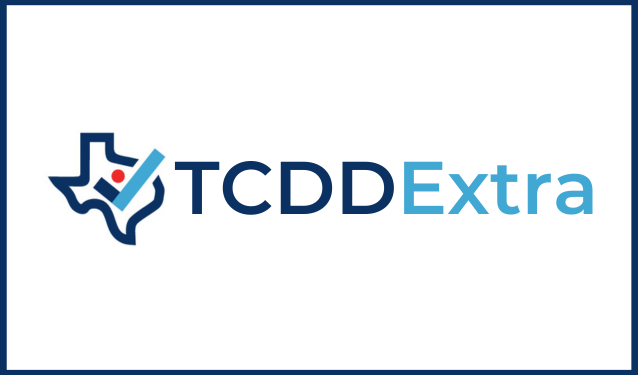

Table of Contents
Welcome to the latest edition of TCDD Extra — a newsletter published every two months with a selection of recent disability news, resources, training, advocacy opportunities, and other information. Along with TCDD-led initiatives, this newsletter also includes information from other disability organizations, news outlets, and government agencies.
In this edition:
- applications open for Texas Partners in Policymaking;
- information for voters with disabilities and poll workers;
- webinars on aging, dementia, and disability;
- and more.
Advocacy & Training Opportunities
Apply for Texas Partners in Policymaking
Texas Partners in Policymaking is accepting applications for its 2024-25 class. The program, coordinated by TCDD, teaches leadership and advocacy skills to people with developmental disabilities (DD) and their family members. Graduates advocate for policy change; foster partnerships with decision-makers; and gain knowledge and confidence to join boards, councils, task forces, and advisory committees. The program includes virtual training sessions, interactive group activities, capstone advocacy projects, and more. The deadline to apply is March 22. To learn more and apply, visit the Texas Partners in Policymaking website.
Applications Due for PATHS Certificate Program
The PATHS Certificate Program prepares graduates for careers as direct support professionals, para-professionals, or child care professionals. The two-year program works in collaboration with the Brazos Valley Center for Independent Living and the Institute on Person-Centered Practices. The institute is a partnership between the Center on Disability and Development at Texas A&M University and the Center on Disability Studies at The University of Texas at Austin. Applications are open until March 1. To learn more about the program and how to apply, visit the PATHS website.
Voting Information
Your Vote Counts! Make Your Voting Plan Today
With early voting underway for the 2024 primary election, TCDD has information for voters with disabilities and poll workers. In Texas and across the country, people with disabilities continue to face barriers that make it difficult to vote. The following list of resources is not comprehensive but provides a starting point to ensure all voters with disabilities are able to cast ballots.
TCDD Voting Information
This webpage includes resources and important things to know for voters as well as poll workers and volunteers.
Disability Rights Texas (DRTx) Voting Information
DRTx provides training on voting rights, surveys polling places for accessibility, works with election officials, and responds to legislative inquiries. This webpage includes handouts, videos, and other voting resources.
People with Disabilities Vote: Here’s What Poll Workers Should Know
In collaboration with partners in the disability community, TCDD developed this video to share essential information on topics such as voting accommodations and how poll workers can support voters with disabilities.
Training Poll Workers for Accessible Voting (PDF, 18 pages, 523 KB)
The National Institute of Standards and Technology, part of the U.S. Department of Commerce, recently published this report that includes training for election officials, best practices for poll workers, and additional resources.
Here are important dates to know for this year’s primary election:
- Tuesday, Feb. 20: First day of early voting
- Friday, Feb. 23: Application deadline for mail-in ballots
- Friday, March 1: Last day of early voting
- Tuesday, March 5: Election Day
Events & Webinars
Webinar Series on Aging, Dementia, and Disability
The National Task Group on Intellectual Disabilities and Dementia Practices (NTG) is hosting a series of webinars from February through April on key issues related to aging, dementia, and people with intellectual disabilities. The webinars are free to attend, but registration is required. The first webinar in the series is scheduled from noon-1 p.m. Central time (CT) on Feb. 27, and will cover the process of aging with Dr. Mary Stephens, a family physician and associate professor in family community medicine at Thomas Jefferson University in Philadelphia. To learn more about the webinars and register to attend, see this NTG flyer (PDF).
Finding Housing Options for People with Disabilities
Jacky Sylvie, the director of community outreach for Finding Independence by the Community for Permanent Support Housing, will give a presentation during the next virtual meeting of the Transition to Adulthood Learning Collaborative at Noon CT on Feb. 27. Sylvie will share her expertise on housing options, affordable housing resources, financial resources, safety products, and more. To receive a meeting invitation, email CSHCNSDG@dshs.texas.gov. Learn more on the Transition to Adulthood Learning Collaborative webpage.
TCDD News
RFA: Increasing Jobs for South Texans with DD
TCDD has issued a Request for Applications (RFA) for a new grant project to increase employment opportunities for early-career people with DD living in the deep south area of Texas, specifically the Rio Grande Valley. The project will investigate barriers to employment for people in the region and create programs that lead to more jobs for South Texans with DD. TCDD has approved annual funding of up to $125,000 for one organization to coordinate the project for up to two years. Applications must be received by March 15.
TCDD 2023 Annual Report Now Available
TCDD recently released its 2023 Annual Report, which summarizes the Council’s work and highlights its impact through grant projects, leadership training, public policy advocacy, and community engagement. Last year, TCDD engaged with more than 25,000 participants in over 50 TCDD-funded projects across Texas. You can download the report in English (PDF, 6.8 MB, 12 pages) and Spanish (PDF, 3.5 MB, 12 pages).
New & Updated Resources
Special Education Funding: What to Know
Disability Rights Texas (DRTx) has developed new resources to explain what Texas parents should know about recent federal funding changes to school health and related services, also known as SHARS. These changes — a result of the federal government finding that Texas school districts had overbilled Medicaid for health-related student services — may disrupt special education for Texas students. The DRTx resources include a webpage and a video that outline the issue and offer guidance to parents. Learn more on the DRTx website.
